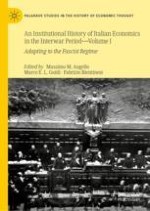2019 | OriginalPaper | Buchkapitel
The Persistence of Tradition: The Economists in the Law Faculties and in the Higher Institutes of Business Studies
verfasst von : Simone Misiani, Manuela Mosca
Erschienen in: An Institutional History of Italian Economics in the Interwar Period — Volume I
Aktivieren Sie unsere intelligente Suche, um passende Fachinhalte oder Patente zu finden.
Wählen Sie Textabschnitte aus um mit Künstlicher Intelligenz passenden Patente zu finden. powered by
Markieren Sie Textabschnitte, um KI-gestützt weitere passende Inhalte zu finden. powered by
